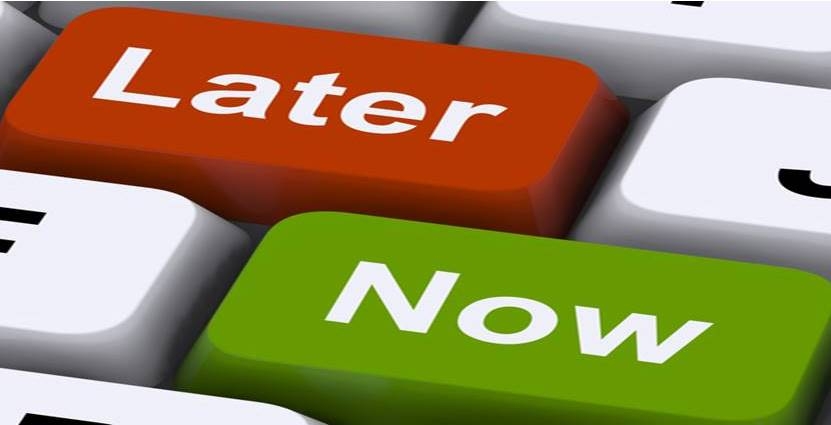19 Oct 2015 How To Conquer Your Procrastination?

Why do we procrastinate? Why do we have the (often subconscious) aversion to completing tasks or behaviors which we know we must do, for our own good?
Can we overcome these aversions and procrastination?
The Science:
Why do we do what we do? What drives our day-to-day, moment-by-moment behavior?
At the most primal level, we are driven by two forces: Fear and Pleasure.
The evolutionary purpose of our existence is very simple: Survive and Reproduce. We share it with all beings, except for that in humans the resulting behaviors and aversions are much more complex than in other beings.
To survive we need to eat and this is why our brain is neurologically hard-wired to experience pleasure when we eat – pleasure that motivates us to seek out food and consume it.
To reproduce we have to find a suitable mate and have sex with him or her. And again this is why our brain is hard-wired to experience pleasure when we seek a potential mate and have sex with her or him.
To survive we also need to keep safe. And this is why our brain is hard-wired to experience fear, anxiety, or pain when we are threatened: physically, emotionally, or socially.
So before we engage in any task or behavior, our brain does a quick scan of its memory system to determine whether the intended task or behavior will produce pleasure or pain?
If we have done this task or behavior before, our brain has memorized it and has attached an “emotional tag” to that experience. If that emotional tag is one of pleasure, our brain’s pleasure system will be injected with the chemical Dopamine, which will send signals to the Reward Anticipation center, which in turn will drive us to execute the task or behavior.
If the emotional tag is one of pain or discomfort, the emotional system in our brain will produce the Stress Hormone Cortisol, which will cause us to avoid the task for as long as we can.
And this is where procrastination and aversion come from.
Our Recommendations:
Like with any intentional change of mindset and behavior, we first have to cultivate our understanding and awareness of what is happening in our brain and why.
Become a student of your aversions and procrastinations.
Cultivate your conscious awareness of your procrastination. What are the tasks or behaviors you procrastinate on? What pain or discomfort is associated with these tasks? When does it happen? Do you experience them more when you are tired at the end of the day? What causes you to succumb in the end, and do the task you have resisted for so long? Like doing your taxes or calling someone for an unpleasant conversation.
Start your Procrastination Journal.
Document your experiences with procrastination and the answers to the questions above. It will help you cultivate your awareness and support you in your quest to conquer your aversions.
Develop specific strategies and plans.
Plan for completing the task at a time when your aversion is softer. Develop ways to make the task easier and perhaps even fun. (This is why tax software packages try to make it as fun to use as possible). Just like with The Habit Loop, you have to plan on rewarding yourself when you complete the dreaded task. Go out for dinner with someone you like, or buy yourself something nice you’ve been wanting for a while.
Practice your plan.
Like with any type of plan, it has a better chance of yielding success when it is well-practiced. If it is a difficult conversation, practice it beforehand with someone “less threatening”. If it is doing your taxes, break it down to sub-tasks, complete them one by one and reward yourself after each one.
Get an Accountability Partner.
This is someone you trust and respect and who has your wellbeing at heart and is willing to motivate you and hold you accountable. The power of an Accountability Partner has been proven in many scientific studies.
Learn More:
To learn more about some of these concepts visit our Willpower Program on our website at www.thewilltochange.com



